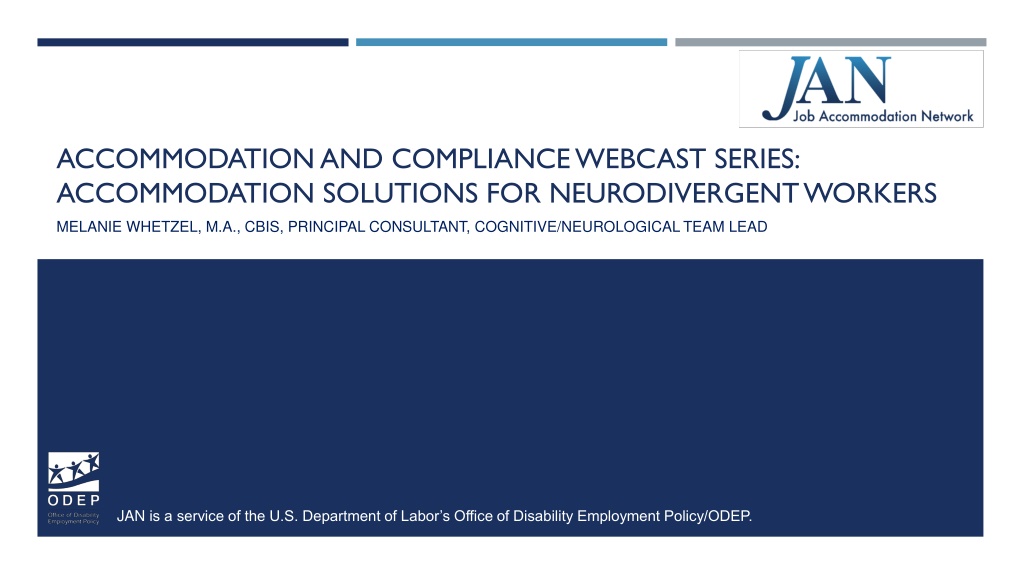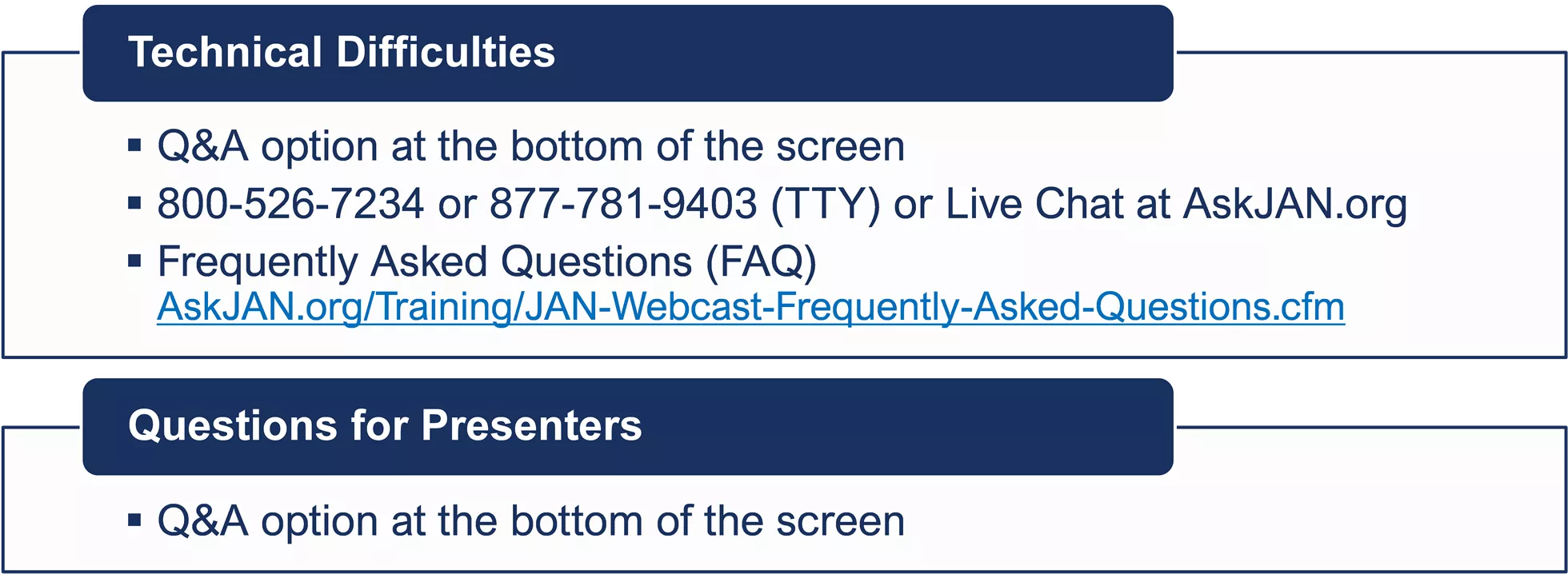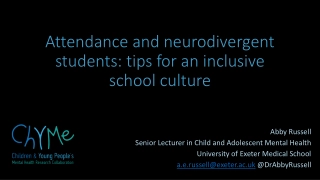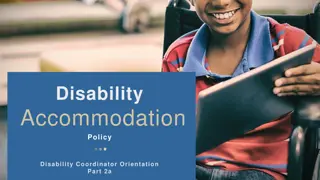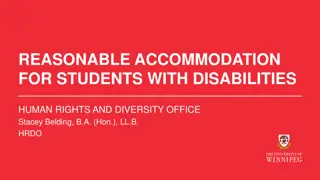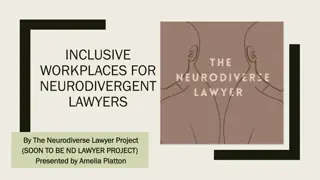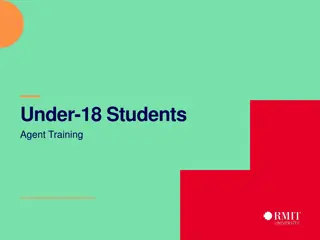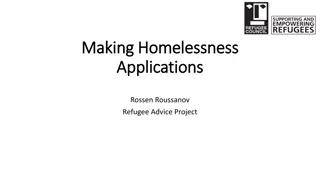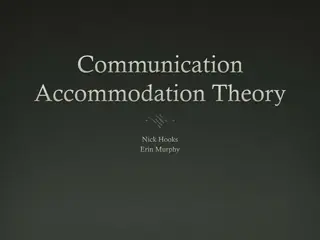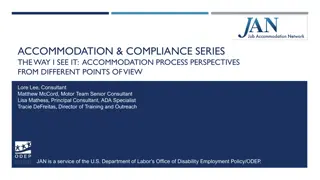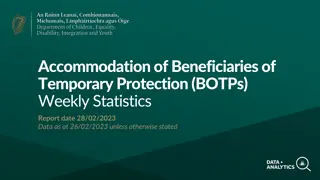Accommodation Solutions for Neurodivergent Workers - Webcast Series
Understanding neurodiversity and its impact in the workplace is crucial for providing proper accommodations to neurodivergent workers. This webcast series, presented by Melanie Whetzel, M.A., CBIS, delves into the range of differences in brain function, common limitations faced by neurodivergent individuals, and the intersection of neurodiversity with the Americans with Disabilities Act (ADA). Gain insights on how to support neurodivergent employees to enhance workplace diversity and inclusion.
Download Presentation

Please find below an Image/Link to download the presentation.
The content on the website is provided AS IS for your information and personal use only. It may not be sold, licensed, or shared on other websites without obtaining consent from the author. Download presentation by click this link. If you encounter any issues during the download, it is possible that the publisher has removed the file from their server.
E N D
Presentation Transcript
ACCOMMODATION AND COMPLIANCE WEBCAST SERIES: ACCOMMODATION SOLUTIONS FOR NEURODIVERGENT WORKERS MELANIE WHETZEL, M.A., CBIS, PRINCIPAL CONSULTANT, COGNITIVE/NEUROLOGICAL TEAM LEAD JAN is a service of the U.S. Department of Labor s Office of Disability Employment Policy/ODEP.
2 HOUSEKEEPING Technical Difficulties Q&A option at the bottom of the screen 800-526-7234 or 877-781-9403 (TTY) or Live Chat at AskJAN.org Frequently Asked Questions (FAQ) AskJAN.org/Training/JAN-Webcast-Frequently-Asked-Questions.cfm AskJAN.org/Training/JAN-Webcast-Frequently-Asked-Questions.cfm AskJAN.org/Training/JAN-Webcast-Frequently-Asked-Questions.cfm Questions for Presenters Q&A option at the bottom of the screen
3 HOUSEKEEPING 2 PPT Slides Link to PPT is included in webcast login email, or see the link now in the chat, or go to this webcast event from the Training page at AskJAN.org Captioning Use the closed caption (CC) option or captioning link in the chat
4 WHAT IS NEURODIVERSITY? Neurodiversity is the range of differences in individual brain function, usually regarded as a normal variation in the human population, including: learning information processing thinking behavior traits
5 NEURODIVERSITY (2) Although the term neurodiversity is especially used in the context of autism spectrum disorders, other cognitive/neurological disabilities can be included: attention deficit/hyperactivity disorder mental health conditions intellectual and learning disabilities
6 COMMON LIMITATIONS Social Skills Organization Concentration Sensory Issues Issues of Change Time Management Stress Management Coworker Interaction Speaking/Communicating
7 NEURODIVERSITY AND THE ADA
8 DEFINITION OF DISABILITY An individual has a disability under the ADA if he or she: has a physical or mental impairment which substantially limits one or more major life activities; has a record of such an impairment; or is regarded as having an impairment.
9 DISABILITY DISCLOSURE Disclosure is when you give out specific, personal information about your disability. Important to provide: 1) The nature of the disability 2) The limitations, or how the disability affects your capacity to learn and/or perform the job effectively 3) Accommodations you will need in order to do the job
10 WHY DISCLOSE? Why Disclose? To ask for job accommodations To receive benefits or privileges of employment To explain an unusual circumstance
11 HIRING Accommodations for Hiring Fewer interviewers Demonstration of skills Questions provided in advance Instruction sheet/card to help Job coach/parent as support Informational interview first, by phone Optimal time for interview
12 FEWER INTERVIEWERS A job applicant for a position in a prison working directly with the inmates asked to have the interview questions sent to him so he could submit the answers in writing in lieu of participating in an interview with multiple people.
13 DEMONSTRATION OF SKILLS Syd, interviewing for a job of camera operator, was asked many abstract questions during the interview that he considered irrelevant to his skill level and qualifications for the job. He asked if he could instead show the interviewer/employer his skills at using the camera.
14 QUESTIONS PROVIDED IN ADVANCE Hailey is applying for jobs and finds herself having difficulty when the interview questions require abstract thinking of scenarios she can recall from past employment or experiences. She requested a list of interview questions in advance and extended time during the interview to give her more time to process the information while formulating a response.
15 INSTRUCTION SHEET / NOTE CARD Sylvia is a programmer who tends to tell too much information about herself and her love for computer languages. She wrote a brief biography about herself that included her education and experience with programming that she carries with her to refer to during interviews, so she doesn t get too wordy and off track.
16 JOB COACH / PARENT AS SUPPORT Matthew is a candidate for a new job. He asks that his dad be allowed to support him in the interview, not as a mouthpiece, but to help him feel more comfortable in an unfamiliar situation and location so that he can respond in ways that better communicate his knowledge and experience.
17 INFORMATIONAL INTERVIEW FIRST, BY PHONE In order to help him analyze the work environment, Joshua asked for an informational interview by phone to help him determine if the job might be a good fit before he went any further in the process. This was also a great first step to help gain confidence and establish rapport before an in-person meet is required.
18 OPTIMAL TIME FOR INTERVIEW A school psychologist interviewing for a new position prefers an early morning appointment where he can best represent himself as he has more energy and concentration at that time. If given the choice of several appointment times, the applicant may not have to disclose his disability at this stage and request the early time slot.
20 SUCCEEDING AND ADVANCEMENT Accommodations for Succeeding and Advancing Mentoring Support animal Working remotely Job restructuring Modifying policies Modifying schedules Reassignment Employee Assistance Program (EAP) Ensure continuous feedback from manager Ensure opportunities to participate in training
21 MENTOR / JOB COACH / SUPPORT PERSON Milly had a successful history of working in retail but was returning to work after being out for many years due to her disability. She requested a job coach, as she felt her social skills were lacking not only due to her disability, but also because she had been home for so long.
22 SUPPORT ANIMAL Jules requested to bring her new support animal to the office to help her with the stress associated with her recent promotion to a new division with more advanced job duties, procedures, and new coworkers.
23 WORKING REMOTELY Jack is a reporter who has difficulty with sensory overload while working in a crowded, busy, noisy, and very bright newsroom. He asked for the accommodation of working from home when he was on deadline.
24 JOB RESTRUCTURING An employer required that all employees work a rotating schedule, which included time at a customer service window. Becker, an employee on the autism spectrum who experiences significant social anxiety, asked to be excused from the window duty because of difficulty interacting with strangers.
25 MODIFYING POLICIES Lea became overly stressed when asked questions by her coworkers that she felt pressured to answer. She often reacted with anger, usually slamming her fist on her desk and shouting for others to leave her alone. After being pulled into a second disciplinary meeting with her supervisor, Lea disclosed and asked for assistance in handling stress levels at work. *Bonus
26 MODIFYING SCHEDULES Nigel is a case manager who has difficulty getting his required documentation completed. He works in a cubicle in a noisy open area that limits his ability to focus and concentrate. With no private space available, he feels a change in the set office hours may help.
27 REASSIGNMENT Due to communication issues related to her disability, an employee had difficulty getting along with her supervisor and requested a reassignment. The employer asked JAN how to determine if this would be the best solution.
28 EMPLOYEE ASSISTANCE PROGRAM (EAP) JJ had difficulty handling change in the workplace and had punched his arm through a wall several times when he hadn t been warned ahead of time that adjustments would need to be made. He asked for written notification of changes at least 24 hours in advance.
29 ENSURE CONTINUOUS FEEDBACK FROM MANAGER Ty was very skilled at resolving IT problems but had difficulty with organization and remembering multiple tasks and information gained in meetings. As he began to take on a lead role, he knew he needed assistance.
30 ENSURE OPPORTUNITIES TO PARTICIPATE IN TRAINING Dom requested the ability to participate in the upcoming mandatory in-person training sessions from home, as being in a large group is difficult for him and hampers his ability to pay attention and learn.
31 RESOURCES A to Z of Disabilities and Accommodations Accommodation and Compliance: Autism Spectrum Equal Employment Opportunity Commission (EEOC) Applying Performance and Conduct Standards to Employees with Disabilities
33 THANK YOU FOR ATTENDING ACCOMMODATION SOLUTIONS FOR NEURODIVERGENT WORKERS Next JAN Webcast: Accommodation Solutions for Fine Motor Limitations Thursday, May 11 @ 2:00 p.m. ET JAN Training Events & Resources AskJAN.org/Events/Trainings.cfm
34 HOW DO I CLAIM THE HR CEU? 1. Don t close the JAN webcast browser 2. Complete the webcast evaluation in new window 3. Click on View your certificate of completion. Or go to AskJAN.org/EvaluationReg.cfm
35 CONTACT JAN FOR MORE INFORMATION Visit AskJAN.org 800.526.7234 877.781.9403 (TTY) Call Live Chat @ AskJAN.org Email JAN@AskJAN.org Facebook Job Accommodation Network Twitter @JANatJAN Social Media
